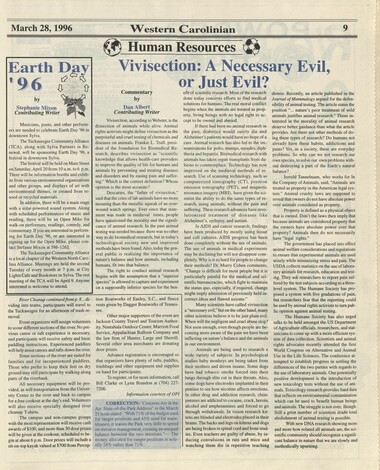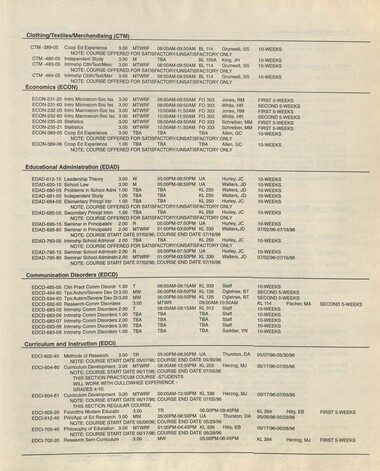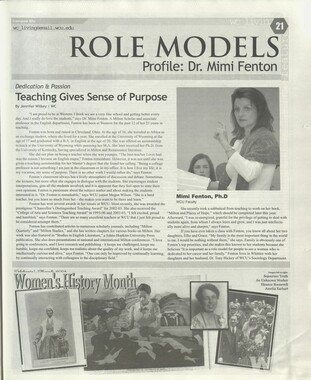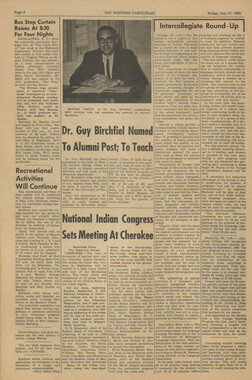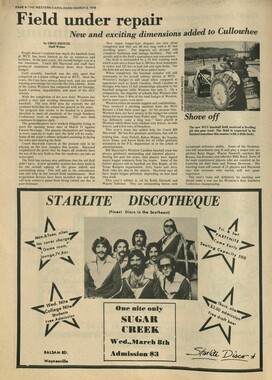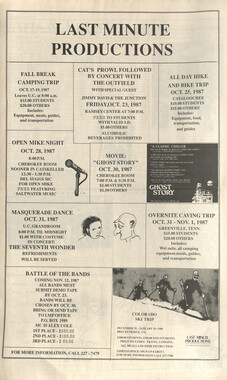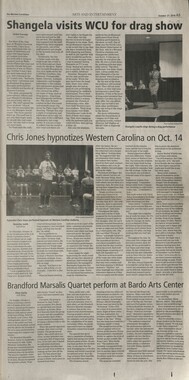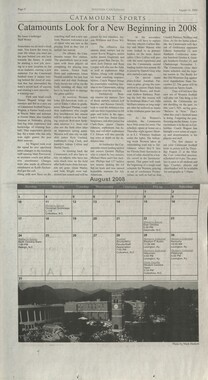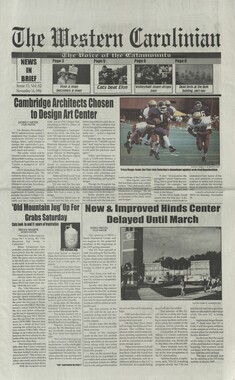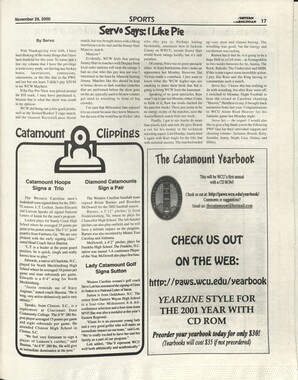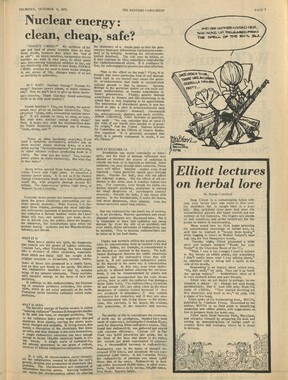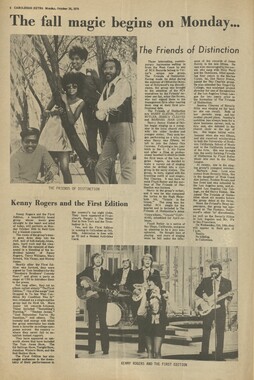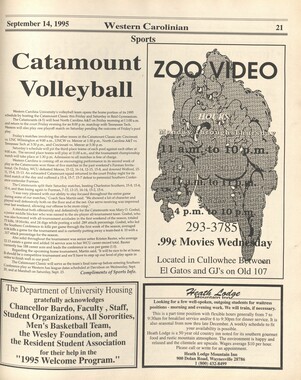Western Carolina University (21)
View all
- Canton Champion Fibre Company (2308)
- Cherokee Traditions (291)
- Civil War in Southern Appalachia (165)
- Craft Revival (1942)
- George Masa Collection (137)
- Great Smoky Mountains - A Park for America (3080)
- Highlights from Western Carolina University (422)
- Horace Kephart (973)
- Journeys Through Jackson (159)
- LGBTQIA+ Archive of Jackson County (89)
- Oral Histories of Western North Carolina (318)
- Picturing Appalachia (6617)
- Stories of Mountain Folk (413)
- Travel Western North Carolina (153)
- Western Carolina University Fine Art Museum Vitreograph Collection (129)
- Western Carolina University Herbarium (92)
- Western Carolina University: Making Memories (738)
- Western Carolina University Publications (2491)
- Western Carolina University Restricted Electronic Theses and Dissertations (146)
- Western North Carolina Regional Maps (71)
- World War II in Southern Appalachia (131)
University of North Carolina Asheville (6)
View all
- Allanstand Cottage Industries (62)
- Appalachian National Park Association (53)
- Bennett, Kelly, 1890-1974 (1463)
- Berry, Walter (76)
- Brasstown Carvers (40)
- Carver, George Washington, 1864?-1943 (26)
- Cathey, Joseph, 1803-1874 (1)
- Champion Fibre Company (233)
- Champion Paper and Fibre Company (297)
- Cherokee Indian Fair Association (16)
- Cherokee Language Program (22)
- Crowe, Amanda (40)
- Edmonston, Thomas Benton, 1842-1907 (7)
- Ensley, A. L. (Abraham Lincoln), 1865-1948 (275)
- Fromer, Irving Rhodes, 1913-1994 (70)
- George Butz (BFS 1907) (46)
- Goodrich, Frances Louisa (120)
- Grant, George Alexander, 1891-1964 (96)
- Heard, Marian Gladys (60)
- Kephart, Calvin, 1883-1969 (15)
- Kephart, Horace, 1862-1931 (313)
- Kephart, Laura, 1862-1954 (67)
- Laney, Gideon Thomas, 1889-1976 (439)
- Masa, George, 1881-1933 (61)
- McElhinney, William Julian, 1896-1953 (44)
- Niggli, Josephina, 1910-1983 (10)
- North Carolina Park Commission (105)
- Osborne, Kezia Stradley (9)
- Owens, Samuel Robert, 1918-1995 (11)
- Penland Weavers and Potters (36)
- Roberts, Vivienne (15)
- Roth, Albert, 1890-1974 (142)
- Schenck, Carl Alwin, 1868-1955 (1)
- Sherrill's Photography Studio (2565)
- Southern Highland Handicraft Guild (127)
- Southern Highlanders, Inc. (71)
- Stalcup, Jesse Bryson (46)
- Stearns, I. K. (213)
- Thompson, James Edward, 1880-1976 (226)
- United States. Indian Arts and Crafts Board (130)
- USFS (683)
- Vance, Zebulon Baird, 1830-1894 (1)
- Weaver, Zebulon, 1872-1948 (58)
- Western Carolina College (230)
- Western Carolina Teachers College (282)
- Western Carolina University (2008)
- Western Carolina University. Mountain Heritage Center (18)
- Whitman, Walt, 1819-1892 (10)
- Wilburn, Hiram Coleman, 1880-1967 (73)
- Williams, Isadora (3)
- Cain, Doreyl Ammons (0)
- Crittenden, Lorraine (0)
- Rhodes, Judy (0)
- Smith, Edward Clark (0)
- Appalachian Region, Southern (3032)
- Asheville (N.C.) (1945)
- Avery County (N.C.) (26)
- Blount County (Tenn.) (195)
- Buncombe County (N.C.) (1680)
- Cherokee County (N.C.) (283)
- Clay County (N.C.) (556)
- Graham County (N.C.) (238)
- Great Smoky Mountains National Park (N.C. and Tenn.) (525)
- Haywood County (N.C.) (3573)
- Henderson County (N.C.) (70)
- Jackson County (N.C.) (4925)
- Knox County (Tenn.) (35)
- Knoxville (Tenn.) (13)
- Lake Santeetlah (N.C.) (10)
- Macon County (N.C.) (421)
- Madison County (N.C.) (216)
- McDowell County (N.C.) (39)
- Mitchell County (N.C.) (135)
- Polk County (N.C.) (35)
- Qualla Boundary (982)
- Rutherford County (N.C.) (78)
- Swain County (N.C.) (2185)
- Transylvania County (N.C.) (270)
- Watauga County (N.C.) (12)
- Waynesville (N.C.) (86)
- Yancey County (N.C.) (72)
- Aerial Photographs (3)
- Aerial Views (60)
- Albums (books) (4)
- Articles (1)
- Artifacts (object Genre) (228)
- Bibliographies (1)
- Biography (general Genre) (2)
- Cards (information Artifacts) (38)
- Clippings (information Artifacts) (192)
- Copybooks (instructional Materials) (3)
- Crafts (art Genres) (622)
- Depictions (visual Works) (21)
- Design Drawings (1)
- Digital Moving Image Formats (2)
- Drawings (visual Works) (185)
- Envelopes (101)
- Exhibitions (events) (1)
- Facsimiles (reproductions) (1)
- Fiction (general Genre) (4)
- Financial Records (12)
- Fliers (printed Matter) (67)
- Glass Plate Negatives (381)
- Guidebooks (2)
- Internegatives (10)
- Interviews (823)
- Land Surveys (102)
- Letters (correspondence) (1045)
- Manuscripts (documents) (618)
- Maps (documents) (177)
- Memorandums (25)
- Minutes (administrative Records) (59)
- Negatives (photographs) (6090)
- Newsletters (1290)
- Newspapers (2)
- Notebooks (8)
- Occupation Currency (1)
- Paintings (visual Works) (1)
- Pen And Ink Drawings (1)
- Periodicals (194)
- Personal Narratives (10)
- Photographs (12977)
- Plans (maps) (1)
- Poetry (6)
- Portraits (4568)
- Postcards (329)
- Programs (documents) (181)
- Publications (documents) (2444)
- Questionnaires (65)
- Relief Prints (26)
- Sayings (literary Genre) (1)
- Scrapbooks (282)
- Sheet Music (2)
- Slides (photographs) (402)
- Songs (musical Compositions) (2)
- Sound Recordings (802)
- Specimens (92)
- Speeches (documents) (18)
- Tintypes (photographs) (8)
- Transcripts (329)
- Text Messages (0)
- A.L. Ensley Collection (275)
- Appalachian Industrial School Records (7)
- Appalachian National Park Association Records (336)
- Axley-Meroney Collection (2)
- Bayard Wootten Photograph Collection (20)
- Bethel Rural Community Organization Collection (7)
- Blumer Collection (5)
- C.W. Slagle Collection (20)
- Canton Area Historical Museum (2110)
- Carlos C. Campbell Collection (462)
- Cataloochee History Project (64)
- Cherokee Studies Collection (4)
- Daisy Dame Photograph Album (5)
- Daniel Boone VI Collection (1)
- Doris Ulmann Photograph Collection (112)
- Elizabeth H. Lasley Collection (1)
- Elizabeth Woolworth Szold Fleharty Collection (4)
- Frank Fry Collection (95)
- George Masa Collection (173)
- Gideon Laney Collection (452)
- Hazel Scarborough Collection (2)
- Hiram C. Wilburn Papers (28)
- Historic Photographs Collection (236)
- Horace Kephart Collection (861)
- Humbard Collection (33)
- Hunter and Weaver Families Collection (1)
- I. D. Blumenthal Collection (4)
- Isadora Williams Collection (4)
- Jesse Bryson Stalcup Collection (47)
- Jim Thompson Collection (224)
- John B. Battle Collection (7)
- John C. Campbell Folk School Records (80)
- John Parris Collection (6)
- Judaculla Rock project (2)
- Kelly Bennett Collection (1482)
- Love Family Papers (11)
- Major Wiley Parris Civil War Letters (3)
- Map Collection (12)
- McFee-Misemer Civil War Letters (34)
- Mountain Heritage Center Collection (4)
- Norburn - Robertson - Thomson Families Collection (44)
- Pauline Hood Collection (7)
- Pre-Guild Collection (2)
- Qualla Arts and Crafts Mutual Collection (12)
- R.A. Romanes Collection (681)
- Rosser H. Taylor Collection (1)
- Samuel Robert Owens Collection (94)
- Sara Madison Collection (144)
- Sherrill Studio Photo Collection (2558)
- Smoky Mountains Hiking Club Collection (616)
- Stories of Mountain Folk - Radio Programs (374)
- The Reporter, Western Carolina University (510)
- Venoy and Elizabeth Reed Collection (16)
- WCU Gender and Sexuality Oral History Project (36)
- WCU Mountain Heritage Center Oral Histories (25)
- WCU Oral History Collection - Mountain People, Mountain Lives (71)
- WCU Students Newspapers Collection (1923)
- Western North Carolina Tomorrow Black Oral History Project (69)
- William Williams Stringfield Collection (2)
- Zebulon Weaver Collection (109)
- African Americans (390)
- Appalachian Trail (35)
- Artisans (521)
- Cherokee art (84)
- Cherokee artists -- North Carolina (10)
- Cherokee language (21)
- Cherokee pottery (101)
- Cherokee women (208)
- Church buildings (190)
- Civilian Conservation Corps (U.S.) (111)
- College student newspapers and periodicals (2012)
- Dams (108)
- Dance (1023)
- Education (222)
- Floods (63)
- Folk music (1015)
- Forced removal, 1813-1903 (2)
- Forest conservation (220)
- Forests and forestry (1198)
- Gender nonconformity (4)
- Great Smoky Mountains National Park (N.C. and Tenn.) (181)
- Hunting (47)
- Landscape photography (25)
- Logging (122)
- Maps (83)
- Mines and mineral resources (9)
- North Carolina -- Maps (18)
- Paper industry (38)
- Postcards (255)
- Pottery (135)
- Railroad trains (72)
- Rural electrification -- North Carolina, Western (3)
- School integration -- Southern States (2)
- Segregation -- North Carolina, Western (5)
- Slavery (5)
- Sports (452)
- Storytelling (243)
- Waterfalls -- Great Smoky Mountains (N.C. and Tenn.) (66)
- Weaving -- Appalachian Region, Southern (280)
- Wood-carving -- Appalachian Region, Southern (328)
- World War, 1939-1945 (173)
Western Carolinian Volume 61 Number 20
Item
Item’s are ‘child’ level descriptions to ‘parent’ objects, (e.g. one page of a whole book).
-
-
March 28,1996 Western Carolinian Human Resources Earth Day by Stephanie Mixon Contributing Writer Musicians, poets, and other performers are needed to celebrate Earth Day '96 in downtown Sylva. The Tuckaseegee Community Alliance (TCA), along with Sylva Partners in Renewal, will be sponsoring Earth Day '96, a festival in downtown Sylva. The festival will be held on Main Street on Saturday, April 20 from 10 a.m. to 6 p.m. There will be information booths and exhibits from various environmental organizations and other groups, and displays of art with environmental themes, or created from reused or recycled materials. In addition, there will be a main stage with a solar-powered sound system. Along with scheduled performances of music and reading, there will be an Open Mike for walk-on performers, readings, comedy, and commentary. If you are interested in performing for Earth Day '96, or are interested in signing up for the Open Mike, please contact Stefanie Mixon at 586-1262. The Tuckaseegee Community Alliance is a local chapter of the Western North Carolina Alliance. Meetings are held the second Tuesday of every month at 7 p.m. at City Lights Cafe and Bookstore in Sylva. The rest meeting of the TCA will be April 9. Anyone interested is welcome to attend. Vivisection: A Necessary Evil, or Just Evil? Commentary by Dan Albert Contributing Writer Vivisection, according to Webster, is the dissection of animals while alive. Animal rights activists might define vivisection as the purposeful and cruel testing of chemicals and diseases on animals. Frankie L. Trull, president of the foundation for Biomedical Research, describes vivisection as "scientific knowledge that allows health-care providers to improve the quality of life for humans and animals by preventing and treating diseases and disorders and by easing pain and suffering." Which is the correct definition? Whose opinion is the most accurate? Descartes, the "father of vivisection," said that the cries of lab animals have no more meaning than the metallic squeak of an overwound watch springs. Ever since that statement was made in medieval times, people have questioned the morality and the significance of animal research. In the past animal testing was needed because there was no other way to do biomedical research, but in today's technological society new and improved methods have been found. Also, today the general public is realizing the importance of nature's balance and how animals, including humans, fit into that balance. The right to conduct animal research begins with the assumption that a "superior species" is allowed to capture and experiment on a supposedly inferior species for the ben- River Cleanup continued from p. 8 ...dividing into teams, participants will travel to the Tuckaseigee for an afternoon of trash removal. Event organizers will assign volunteers to scour different sections of the river. No previous canoe or raft experience is necessary, and participants will receive safety and basic paddling instructions. Experienced paddlers will help assist canoes and rafts down the river. Some sections of the river are suited for families and for inexperienced paddlers. Those who prefer to keep their feet on dry ground may still participate by walking along parts of the riverbank. All necessary equipment will be provided, as will transportation from the University Center to the river and back to campus for a free cookout at the day's end. Volunteers will also receive specially designed river cleanup T-shirts. The campus and non-campus groups with the most representation will receive cash awards of $ 100, and more than 50 door prizes will be given at the cookout, scheduled to begin at about 6 p.m. Door prizes will include a sit-on-top kayak valued at $700 from Percep tion Boatworks of Easley, S.C., and fleece vests given by Dagger Boatworks of Tennessee. Other major supporters of the event are Jackson County Travel and Tourism Authority, Nantahala Outdoor Center, Marriott Food Service, Appalachian Balloon Company and the law firm of Hunter, Large and Sherrill. Several other area merchants are donating door prizes. Advance registration is encouraged so that organizers have plenty of rafts, paddles, trashbags and other equipment and supplies on hand for participants. To register, or for more information, call Bill Clarke or Lynn Brandon at (704) 227- 7206. Information courtesy of OPI CORRECTION: "Concerns Are in the Air: State-of-the-Park Address" in the March 21 issue stated: "With 71 % of the budget used for ranger positions and 43% used for maintenance, it leaves the Park very little to spend on resource management, creating an unequal balance between the two missions."— The money allocated for ranger positions is actually 28% rather than 71%. efit of scientific research. Most of the research done today concerns efforts to find medical solutions for humans. The real moral conflict begins when the animals are treated as property, living beings with no legal right to accept to be owned and abused. If there had been no animal research in the past, diabetics would surely die and Alzheimer's patients would have no hope of a cure. Animal research has also led to the immunizations for polio, mumps, measles, diphtheria and hepatitis. Biomedical research with animals has taken organ transplants from dubious to commonplace. Technology has now improved on the medieval methods of research. Use of scanning technology, such as computerized tomography (CT), positron emission tomography (PET), and magnetic resonance imagery (MRI), have given the scientist the ability to do the same types of research, using animals, without the pain and suffering. These research advances have revo- lutionized treatment of diseases like Alzheimer's, epilepsy, and autism. In AIDS and cancer research, findings have been produced by mostly using tissue and cell cultures. AIDS progress has been done completely without the use of animals. The use of animals in medical experiments may be declining but will not disappear completely. Why is it so hard for people to change their methods? Dr. Murry Cohen comments, "Change is difficult for most people but it is particularly painful for the medical and scientific bureaucracies, which fight to maintain the status quo, especially, if required, change might imply admission of previously held incorrect ideas and flawed axioms." Many scientists have called vivisection a "necessary evil," but on the other hand, many other scientists believe it to be just plain evil. When will the negligent and cruel abuse stop? Not soon enough, even though people are becoming more aware of the pain we have been inflicting on nature's balance and the animals in our environment. Animals are being used to research a wide variety of subjects. In psychological studies baby monkeys are being taken from their mothers and driven insane. Some dogs have had tobacco smoke forced into their lungs through slits cut in their throats. Also, some dogs have electrodes implanted in their penises to see how nicotine affects erections. In other drug and addiction research, chimpanzees are addicted to cocaine, crack, heroin, alcohol and amphetamines and forced to go through withdrawals. In vision research kittens are blinded and electrodes placed in their brains. The backs and legs on kittens and dogs are being broken in spinal cord and bone studies. Even teachers are guilty of abuse, by inducing convulsions in rats and mice and watching them die in repetitive teaching demos. Recently, an article published in the Journal of Mammalogy argued for the defen- sibility of animal testing. The article states the position "... nature's poor treatment of wild animals justifies animal research." Those interested in the morality of animal research deserve better guidance than what the article provides. Are there not other methods of doing these types of research? Do humans not already have these habits, addictions and pains? Yes, as a society, these are everyday problems. So why can we not research our own species, to solve our own problems without destroying a part of the Earth's natural balance? Jerrold Tannebuam, who works for In the Company of Animals, said, "Animals are treated as property in the American legal system." Animal cruelty laws are supposed to reveal that owners do not have absolute power over animals considered as property. Property is defined as a physical object that is owned. Don't the laws then imply that because animals are considered property that the owners have absolute power over that property? Animals then do not necessarily have "legal rights." The government has placed into effect animal welfare considerations and regulations to ensure that experimental animals are used wisely while minimizing stress and pain. The USDA collects statistics on the use of laboratory animals for research, education and testing. They ask researchers to report pain suffered by the test subjects according to a three- level system. The Humane Society has proposed a system with five gradations of pain, but researchers fear that the reporting could be used by animal rights activists to turn public opinion against animal testing. The Humane Society has also urged talks to be held amongst the US Department of Agriculture officials, researchers, and statisticians to come up with a more efficient system of data collection. Scientists and animal rights advocates recently attended the first World Congress on Alternative and Animal Use in the Life Sciences. The conference attempted to establish progress in settling the differences of the two parties with regards to the use of laboratory animals. One potentially positive development is the introduction of new toxicology tests without the use of animals. Toxicology research provides hard data that reflects on environmental contamination which can be used to benefit human beings and animals. The struggle is not over, though. Still a great number of scientists doubt total abolishment of animal testing is possible. With new DNA research showing more and more how related all animals are, the scientific community should recognize a significant balance in nature that we are slowly and methodically upsetting.
Object
Object’s are ‘parent’ level descriptions to ‘children’ items, (e.g. a book with pages).
-
The Western Carolinian is Western Carolina University's student-run newspaper. The paper was published as the Cullowhee Yodel from 1924 to 1931 before changing its name to The Western Carolinian in 1933.
-
